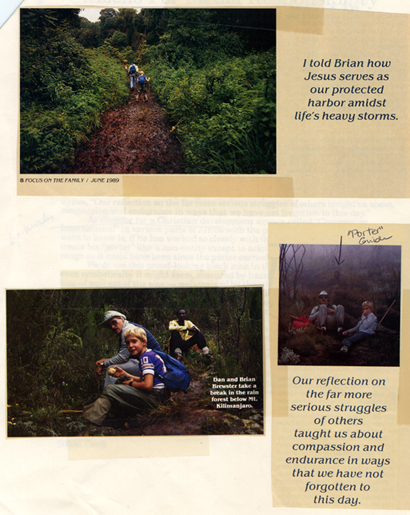|
Focus on the Family As director for a Christian development agency called “Compassion International” in various parts of Africa he works with the poor and impoverished. What I want to know is, if he has worked so closely with these folks then why does he treats his “porter” like a non-entity except to acknowledge the hike was not so rough as it could have been since the porter carried all their supplies? We do see this proud-looking black man in the background of all the photos, even symbolically, it might seem, obscured by haze in one. But, you can always see him — well out of the way — well-trained by the white men that came before, he carries all the food and belongings in a heavy burlap bag stuffed to the perhaps fifteen times the size of the day packs the father and son carry. So this is how you white boys learn endurance, eh? And I’d say you both have some lessons to learn about racism too. Maybe the next trip Dan and Son might carry their share of the load and the “porter,” a man whose face shines with experience and character, could be treated like a friend, instead of a pack horse/slave — cheap at twice the price. They could, for instance, refer to this “porter” as a “guide,” for that is what he surely is if he leads them to the top of Kili. For it is these lessons about racial equality that are most direly needed by white children growing up in Africa and until that time, Dan only fantasizes that he teaches his son about compassion and the “serious struggles of others.” Sincerely, |
Since October 3, 2001
 This letter was written June 22, 1989 in response to an article called “The Lesson of Kilimanjaro” (and the graphics reproduced on this page) that originally appeared in the Focus on the Family magazine. It is reproduced here for archival purposes and was not published by Dr. James Dobson's organization.
This letter was written June 22, 1989 in response to an article called “The Lesson of Kilimanjaro” (and the graphics reproduced on this page) that originally appeared in the Focus on the Family magazine. It is reproduced here for archival purposes and was not published by Dr. James Dobson's organization.